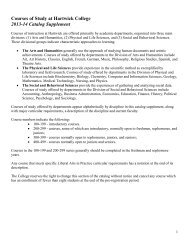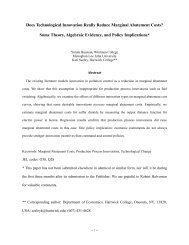Table of Contents - Hartwick College
Table of Contents - Hartwick College
Table of Contents - Hartwick College
You also want an ePaper? Increase the reach of your titles
YUMPU automatically turns print PDFs into web optimized ePapers that Google loves.
Biochemistry<br />
Biochemistry, the interface between chemistry and biology, is concerned<br />
with the chemistry <strong>of</strong> biological reactions, and the regulation <strong>of</strong> these<br />
reactions. This rapidly growing field <strong>of</strong> study includes the investigation <strong>of</strong><br />
chemical changes in disease, drug action, and other aspects <strong>of</strong> medicine as<br />
well as in nutrition, genetics and agriculture. The work being done in<br />
biochemistry in terms <strong>of</strong> medical, pharmaceutical and genetic engineering<br />
research will have increasing impact on our society. It is imperative,<br />
therefore, that people involved in research and businesses in these areas<br />
not only are capable scientists, but are educated to deal with moral and<br />
ethical questions arising from the advance <strong>of</strong> biochemical knowledge. The<br />
study <strong>of</strong> biochemistry as part <strong>of</strong> a liberal arts and sciences education<br />
fosters the development <strong>of</strong> the broad perspective and analytical abilities<br />
necessary to deal with such questions. Biochemistry functions under the<br />
direction <strong>of</strong> the departments <strong>of</strong> biology and chemistry, and students<br />
seeking additional information should contact the chair <strong>of</strong> either<br />
department.<br />
Requirements for a major in biochemistry include courses in biology,<br />
chemistry, and biochemistry as well as auxiliary courses in mathematics<br />
and physics. A required senior research project involves laboratory and<br />
library work, interpretation <strong>of</strong> data, and oral and written reports <strong>of</strong> the<br />
results.<br />
In addition to the independent research required for their senior project,<br />
biochemistry majors <strong>of</strong>ten assist with faculty research or do collaborative<br />
research with a pr<strong>of</strong>essor.<br />
Biochemical advances in the knowledge <strong>of</strong> the action <strong>of</strong> natural hormones<br />
and antibiotics promise to aid in the further development <strong>of</strong><br />
pharmaceuticals. In addition, discoveries resulting from biochemical<br />
research, including work being done in medical, pharmaceutical and<br />
genetic engineering, continue to open up new frontiers. <strong>Hartwick</strong>’s major<br />
in biochemistry <strong>of</strong>fers excellent preparation for entry-level positions in<br />
biochemistry research or for graduate work in the field. Students<br />
interested in attending medical school also obtain an exceptionally good<br />
science background through a major in biochemistry.<br />
Faculty/Coordinator<br />
Walter O. Nagel<br />
Courses<br />
405, 406 Biochemistry I, II (3 credits) An in-depth study <strong>of</strong> the<br />
organic chemistry <strong>of</strong> the molecular components <strong>of</strong> cells including<br />
proteins, enzymes (kinetics and mechanisms), coenzymes, nucleic acids,<br />
lipids and carbohydrates. The metabolism and biosynthesis <strong>of</strong> these<br />
constituents including glycolysis, Krebs cycle, pentose shunt, electron<br />
transport, glycogen synthesis, and lipid oxidation and synthesis will be<br />
studied. The energy transformation involved in and the regulation <strong>of</strong><br />
these pathways will also be discussed. Special topics to be included are<br />
hormone biochemistry, biochemical genetics (replication, transcription<br />
56
















